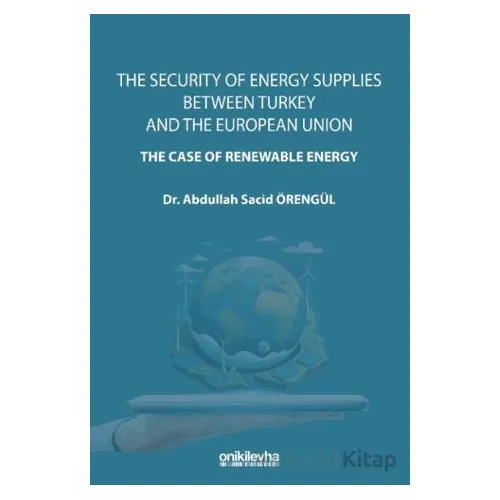The Security Of Energy Supplies Between Turkey and The European Union - The Case Of Renewable Energy
Hiç mesaj bulunmadı
| Taksit | Tutar | Toplam |
|---|---|---|
| Tek Çekim | 437.00 TL | 437.00 TL |
| 2 Taksit | 218.50 TL | 437.00 TL |
| 3 Taksit | 151.49 TL | 454.48 TL |
| 4 Taksit | 114.71 TL | 458.85 TL |
| 5 Taksit | 92.64 TL | 463.22 TL |
| 6 Taksit | 77.93 TL | 467.59 TL |
| Ödeme Türü | Toplam Tutar |
|---|---|
| Diğer Kredi Kartları | 437.00 TL |
| Havale / Eft | 437.00 TL |
| Posta Çeki | 437.00 TL |
| Kapıda Ödeme | 452.00 TL |
Kapıda ödemeli siparişlerde +15,00TL kapıda ödeme hizmet bedeli ilave edilir. | |
- Vade farksız taksitler KOYU renkte gösterilmektedir.
- X+X şeklinde belritilen taksitler (Örneğin: 2+3) 2 taksit olarak işleme alınmakta ancak ilgili bankanın kampanyası dahilinde 2 taksit üzerinden işlem yapıldığı halde 2+3 yani 5 taksit olarak kartınıza ve ödemenize yansımaktadır. (2 taksit seçilmiş olsa bile banka kampanyası dahilinde ekstradan vade farkı eklenmeden işlem 5 taksite bölünmektedir.)
The Security Of Energy Supplies Between Turkey and The European Union - The Case Of Renewable Energy
The regulation of energy supply security represents a complex and evolving area of law, particularly in the context of the increasing integration of renewable energy sources. Contemporary energy markets are deeply interconnected and require a balanced and adaptive regulatory framework that addresses both conventional and renewable energy generation. While the long-term objective is the gradual phasing out of fossil fuels, existing energy systems continue to depend on them to ensure grid stability, particularly given the intermittent nature of renewable sources such as wind and solar, which often necessitate conventional backup to maintain supply reliability. Despite widespread consensus on the centrality of renewables in future energy systems, the transition toward a low-carbon energy framework remains impeded by significant regulatory shortcomings and coordination challenges. Realising a secure and sustainable energy future therefore demands more coherent, consistent and enduring regulatory interventions across all levels of governance. This book critically examines the roles of energy agencies and regulatory mechanisms operating at the global, regional and national levels, using Turkey as a case study, and assesses their current and prospective contributions to enhancing energy supply security and advancing the renewable energy transition.











